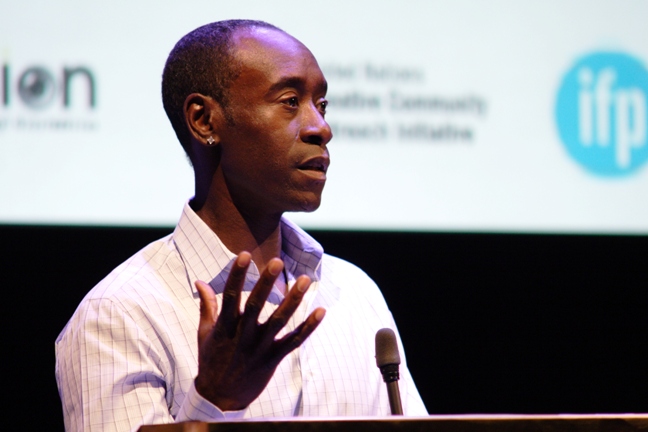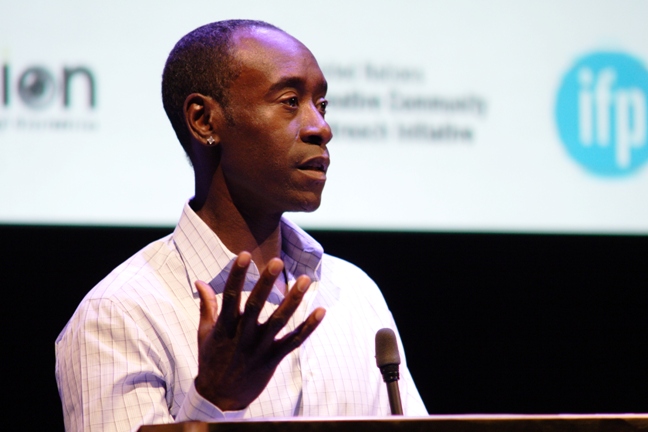 Back to selection
Back to selection
ENVISION 2012: EIGHT TIPS FOR SOCIAL ISSUE FILMMAKERS

Last week in New York City, the Independent Filmmaker Project, the United Nations Department of Public Information, and the Ford Foundation presented Envision 2012: Stories for a Sustainable Future. The two day event featured screenings of sustainability-focused documentaries (including Jessica Yu and Participant Media’s new Last Call at the Oasis), keynote addresses from Don Cheadle and Alexandra Cousteau, and panel discussions that included social issue advocates and established filmmakers. And, while the discussions this year did focus on the issue of sustainability, there was still plenty of universal wisdom dispensed that social issue filmmakers – no matter their chosen subject matter – should bear in mind.

Here were just a few of the most intriguing points:
1. Appeal directly to your audience. On Monday night, one attendee asked filmmaker Jessica Yu why Last Call at the Oasis focused primarily on America, when water quality and quantity issues were far worse in other parts of the world. Yu theorized that audiences are less likely to act if they feel as if the issues on screen are entirely divorced from their personal situation, or as she put it, “someone else’s problem.” By setting her film in America – and shedding light on how the very people who are most likely to watch will be affected by the issues explored – Yu believes her audience will be inspired towards action.

2. Don’t be shy about seeking out partners. Just before the end of Monday night, Yu made a point to note that she and her team were not only open to partnering with political organizations and non-profit groups, but were enthusiastically seeking such alliances. Her frankness was quickly rewarded – as a representative from the United Nations raised his hand to praise Last Call, and publically invited Yu to screen her film at the upcoming Rio +20 United Nations conference.
3. Remain open to ambiguity. Tuesday morning, director Lixin Fan presented clips from his 2009 documentary Last Train Home, which follows two Chinese migrant workers. Fan admitted that when he first set out to make the documentary, he viewed China’s migrant workers as a uniformly exploited class – “modern slaves,” as he put it. But, as filming commenced, he realized that the issue was far more complex. “Globalization is a very complicated machine,” he explained. “There’s a lot of grey between the black and white.”
4. Keep your story simple. During a panel on sustainability issues in the modern city, the conversation turned towards how artists can transform hard data into something more compelling. Samasource founder Leila Janah argued that documentary filmmakers should strive to attract the widest possible audience. Citing the mainstream success of Invisible Children’s Joseph Kony documentary, she argued that, “even if (a) film dramatically simplifies the issue, who cares?” If the goal is to spread awareness about a topic that the public wouldn’t otherwise engage with, the ends might justify the means.
5. Work hard to find great subjects. Academy Award nominated filmmaker Rachel Grady (Jesus Camp) presented clips from her new film Detropia, which artfully examines Detroit’s recent financial woes. During her presentation, Grady discussed the challenging process of finding the most compelling subjects to follow. For Detropia, Grady and her team initially met with hundreds of Detroit residents before narrowing the film’s focus down to a handful of subjects. Grady also noted the importance of choosing subjects who were deeply engaged in the issues she wanted her film to explore, and who believed in the narrative she was trying to tell. This proved especially challenging for Detropia, due to poverty. “If someone is just trying to feed their kids,” she explained, “it’s hard to get them involved in public policy.”
6. Search out the best format for your story. During a series of pitch presentations for activists seeking creative partners, Radha Muthiah made an impassioned plea for clean cook-stove reform, sharing the horrifying stat that two million premature deaths occur each year due to open fire stoves. When moderator Eugene Hernandez opened the room up to comments, one filmmaker suggested that a feature film might not be the most effective means towards spreading awareness about this particular issue. Instead, he suggested Muthiah seek out a celebrity chef to partner with, and to consider producing a series of cooking webisodes to shed light on this issue. And though this suggestion drew a chuckle from the audience, it also served as a reminder that different causes call for different mediums.
7. Don’t miss your chance to frame the conversation. During her Tuesday keynote address about water sustainability, filmmaker and activist Alexandra Cousteau offered some hopeful words. “We can restore ecosystems,” she argued while speaking about the fight to restore the Colorado River wetlands. “It’s not over until it’s over.” During her Q&A, she went on to assert that social issue filmmakers have a responsibility to frame their issues in a responsible manner, and to curb more reactionary (as she put it, “Chicken Little”) perspectives. This position was echoed earlier in the day by Rachel Grady, who argued that social issue filmmakers should offer glimmers of hope on their given topics, even if they’re slim.
8. The more common the practice, the more acceptable it becomes. One of the most interesting sections in Last Call at the Oasis finds a team of marketing experts struggling to come up with a campaign to help the public embrace ‘recycled water’ (see also: purified sewage water) as a viable option. We watch as team members brainstorm various solutions – euphemistic product names, celebrity plugs, appeals to morality. And yet during test groups, the public continues to balk at the product itself. Are there any steps creative minds can take to convince the public to embrace a moral good it finds impalpable? Later, in the film, one activist shares what he feels to be an effective strategy – traction. The more common it becomes to see others drinking ‘recycled water,’ the less severe the culture stigma towards the practice becomes.
This is a metaphor that can extend towards the marketing of many issue-based films, especially those that offer truths that are hard to swallow. Sometimes the easiest way to effect change on a macro-scale is to start convincing your audience to adopt new practices on the individual level.
